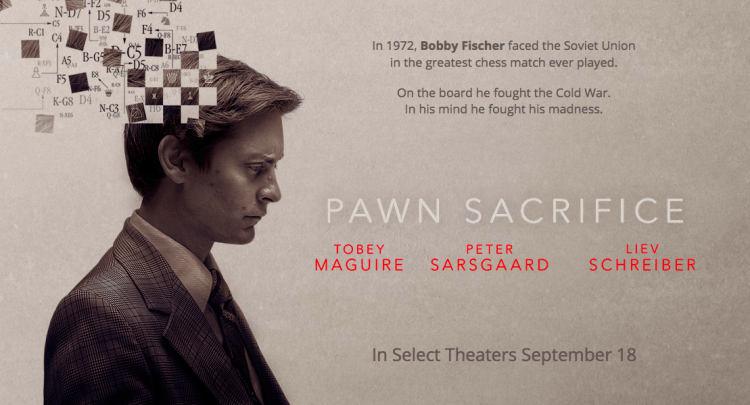For whatever reason, possible due to the mystery or ineffable nature of his life, Bobby Fisher became a well continually drawn for the ever-popular “biopic” treatment. I’m not sure whether Tobey Maguire desired a chance at award season glory or something else struck him, but the Edward Zwick film Pawn Sacrifice does, at times, seem more concerned with that end than it does being a good movie. Like Ray before it, and probably a hundred other such films, it’s interesting and entertaining, but lacks in being a fully fleshed-out concept.
Like most films involve a figure of some genius in some area of expertise, Pawn Sacrifice takes the route of “mental illness” to develop sympathy for Fischer. The script often uses that excuse as a way to explain his aberrant behavior, his crazy demands at international chess tournaments (both to the U.S. government and otherwise), as well as his hatred for Jews (despite being Jewish himself). The latter two, far as my research goes, seem well-founded in fact, while the former much less so. Certainly, we can attribute anti-social behavior with mental illness, but is that necessarily the case? Far from it! He was never formally diagnosed with anything (nor, I wager, would he ever let a psychological take a look at him), but the film often uses this as a crutch to explain too much. In that sense, most audience members should find the film rather predictable in its character arc and progression (i.e., crazy genius biography movie, you know the drill).
At the same time it “deals” with the import of brash genius + crazy, Pawn Sacrifice is also highly entertaining, and funny. Although, I am curious whether or not I am supposed to laugh at what’s happening, or simply stand aghast at it. That duplicitous sentiment of the viewer derives from the lack of a consistent tone. While I have called it a biopic throughout this review, the film switches from inspirational sports film to comedy to serious drama within 5 minutes, and the constant genre whiplash becomes jarring. The musical cues, especially, don’t help; while meant to be timely in their use to inform the viewer of the time period, they’re almost predominantly upbeat rock and roll pop songs. Thus, when the film goes from dramatic moment to happy-go-lucky fun times, you’re not quite sure what to think.
Maybe part of that also emerges from the, ahem, lack of nuance in the film altogether. For being a film about chess, a rather intellectual sport if we could categorize any sports like that, Zwick takes little opportunity to actually show the games themselves. Watching other sports movies, we often already obtain a good sense of what’s happening when, say, some guy hits the ball with a bat or catches the ball to get a touchdown. Here, we almost never get to see the playing field from a practical perspective; the entire movie would rather show chess pieces moved in dramatic angles with dramatic Foley sounds, so you get the visual feel of an intense mental game between two opponents. Unfortunately, that means I’ve got literally no idea what makes Bobby Fisher a good or bad chess player, or why Game 6 was a brilliancy, or what even made Fisher’s game remarkable. Maybe it involves too much chess theory, or maybe those helming this project assumed its audience wouldn’t care about what happened, but I certainly would like to know! It’s fine to focus on the emotional aspect, but you can’t completely ignore the game!
Still, even if the Based on a True Story credential seem continually undercut by inconsistencies and a seeming lack of direction or understanding of chess, every actor sells their role with aplomb that’s unworthy of the film. Maguire actually does a rather standout performance here, and while it sometimes veers too close to Spider Man 3’s “Emo-Parker”, it tends to work more often than not. Some actors seem born to play roles of perpetual awkwardness, and Bobby Fischer certainly fits in that niche; that Maguire also can play a paranoid person as well with a chilling conviction also speaks to his talent in the role. Liev Schreiber is no less convincing as Boris Spassky, Fisher’s rival for the world chess championship. While he isn’t much of a friend of Fisher as he was in real life (remember: movies like this need an antagonist of some sort), he remains an intimidating force and a suitable motivating factor. Peter Sarsgaard also appears as friend/mentor/former priest William Lombardy, who isn’t given much to do, but whose presence is much appreciated nonetheless.
Pawn Sacrifice, then, seems best defined by its completely bizarre and jarring postscript which completely invalidates the emotional high of Fisher’s success. It tries to cram in the rest of Fisher’s life into a minute and a half, thereby completely destroying his characterization in the film and literally rendering the entire movie a waste of time. Sure, you made an entertaining film, but so many disparate elements just seem like a total mess with no clear direction. With that said, I enjoyed Pawn Sacrifice overall, but man if it wasn’t frustrating!

